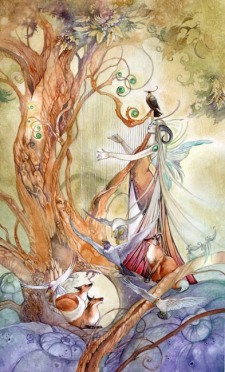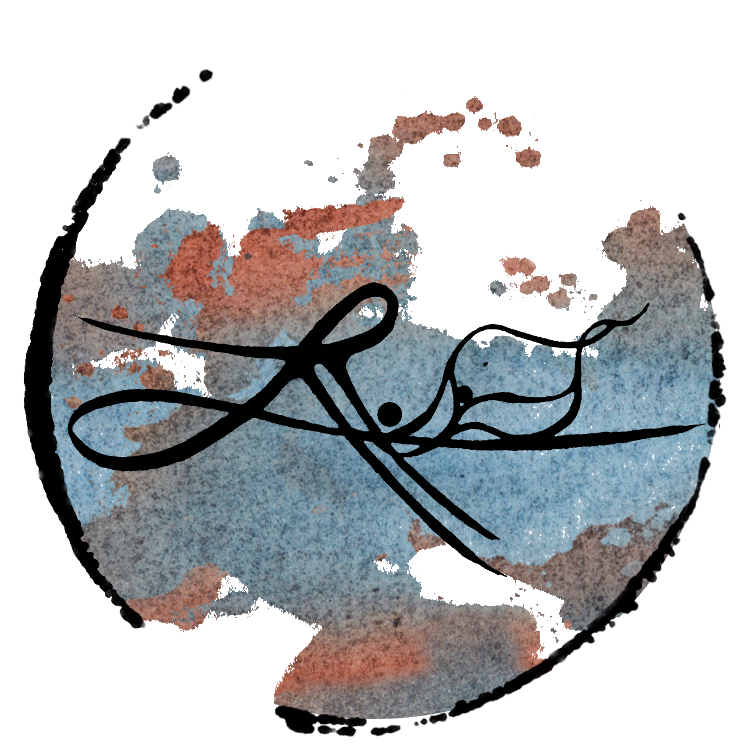The latest issue of the Alternative Religions Educational Network’s newsletter just came out this past weekend, and I was excited to be included as one of those featured in an interview with the editor, Christopher Blackwell. We chatted about my background being raised in a liberal Catholic tradition flavored by my father’s Irish heritage, and how that shaped my spiritual journey towards Druidry as I live and practice it today. It was great fun! You can read the whole interview here.
 One thing we touched on was the Oran Mór, or as I usually call it, the Song of the World. The Oran Mór is, in my view, very much like the concept of the Tao: it is both “the way of things,” a guide or path to follow, and also “the way things are,” the complex and irreducible nature of existence itself. Chris asked me to talk a little bit more about how this cosmological concept is reflected in my Druidry. Here’s an excerpt from the interview:
One thing we touched on was the Oran Mór, or as I usually call it, the Song of the World. The Oran Mór is, in my view, very much like the concept of the Tao: it is both “the way of things,” a guide or path to follow, and also “the way things are,” the complex and irreducible nature of existence itself. Chris asked me to talk a little bit more about how this cosmological concept is reflected in my Druidry. Here’s an excerpt from the interview:
Christopher: You refer to something that you call the World Song. Could you explain a bit more of what that you mean by that?
Alison: This idea of the Song of the World is open for debate in modern Druidry — I don’t know many other Druids who work with it, although it’s become a central aspect of my own practice. There is a phrase that is found mostly in the oral traditions of Scotland and Ireland, known as the Oran Mór (or “Great Song”). In Christian times, it became one of the names used to refer to God, although there’s some evidence in Celtic mythology and folklore that suggests the idea goes back to pre-Christian times.
For me, the Song of the World is something like Divine Harmony — it’s not a personal creator god, so much as the on-going creative process of the universe discovering itself, unfolding playfully and joyfully in an endless and infinite variety of ways, all of which are part of an exquisite harmony that is inherent to existence yet always changing and deepening. In his book The Salmon in the Spring: The Ecology of Celtic Spirituality, Jason Kirkey explains it this way:
“The concept of the Oran Mór makes explicit a belief that existence is song and therefore a process rather than a thing. God, to the Celtic imagination, is Being not a being; the process of Becoming rather than something which creates; the on-going self-creation or atuopoiesis of the cosmos.”
This isn’t exactly monism, because the World Song isn’t a “substance” or a deity. Just as you cannot create a symphony with a single instrument alone but must have many instruments playing together in harmony, and yet you can still experience the symphony itself as a unifying whole in which all of these individual instruments participate.
In the same way, each of us has a song that we are singing by the way we live our lives — the ways we move through the world, the very physicality of our embodied selves, create vibrations (quite literally! but also metaphorically and spiritually) that participate in and actively create the Song of the World. We join with it our own voices, the music of our bodies humming, pumping blood, inhaling and exhaling, neurons and nerves buzzing. The air we move through shifts around us with every stride, and our laughing and crying shape it. When we sing and move and live in harmony with the World Song, our own songs are amplified, modulated and carried along — our lives become beautiful, our hearts become soft and permeable, our minds become nimble and familiar with the patterns of how things dance.
This idea — that we each have a song, a soul-song, and that everything, the landscape and the gods and the world itself, has a soul-song as well — underlies a kind of lovely animism that permeates everything, everywhere, and fills it utterly with life and movement. It bestows a special sacredness to space, to limits and the separation of necessary absence through which limited, finite beings move. The Song of the World offers us a way to understand our unity and community without sacrificing our individuality and uniqueness, our creativity and our freedom.
~~~
We talked about so many topics, this is just a small taste! So I hope you’ll head on over and check out the rest of the interview, as well as the other interviews and articles featured in the issue. (And thanks again to Chris for the chance to share with his readers!)
Meanwhile, I’m curious: for those fellow Druids out there, is the Oran Mór part of your approach to Druidry? Does it shape your beliefs or practices in any way? If so, how? And if you’re not a Druid, do you have a similar concept in your own tradition?
Let me know in the comments!
Have another question for the Q&A series? Leave it in the comments below, ask me on Tumblr, or email me.
Photo Credit:
• “Queen of Wands,” by Stephanie Pui-Mun Law © 2010 [source]

ALISON, Thank you for this. I honestly have never heard of the term Oran Mór before and it’s wonderful to find what seems to me to be a Gaelic counterpart for something I’ve been using as my magical motto and rosary mantra for just about the last 25 years. In my practice the expression I’ve come use to express this is “BLESSED IS THE GREAT WAY OF THINGS!” you’ll find it throughout my blog essays and as a signature in my emails. May you and yours be blessed and protected within the Song of the World. – EARRACH
LikeLike
Awesome, Earrach! Thanks for your comment. 🙂
LikeLike
I’ve never thought it out loud, but like you, this IS my practice. I feel it more than “hear” it, although it’s a wonderful meditation to allow the sounds one hears to become one continuous, ever-changing stream. I’m trained in Buddhist mindfulness and this is the basic ‘mindfulness of sound’ practice, but as a ban drui, it takes on a deeper meaning than just “allowing” sounds to exist as they are. There is, as you say, the soul-song of each being, which is partly the “noise” we all make in the world – the auditory, “physical” evidence of our presence, but this can lead to a greater opening to the soulsong of each being and the harmony of them, for me, felt in the body as bliss and engagement.
Have you read Neal Douglas Klotz’ ‘Prayers of the Cosmos’? in his footnotes, he translates the Aramaic word for “sin” as “being out of harmony.”
Deep.
LikeLike
No, I haven’t read Klotz — but I’ve heard that translation before! 🙂 I also hadn’t heard of the Buddhist “mindfulness of sound” practice… that sounds really cool. I’ve been doing more and more of this type of mindfulness as part of my attempt to weave together animist, shamanic and ecological approaches in my Druidry. Maybe looking more into the Buddhist practice could help me deepen that work — thanks for sharing about it. 🙂
LikeLike
Hi Alison,
I too saw many similarities between the concept of Oran Mór and Buddhism – what Thich Nhat Hanh calls “Interbeing”. Though I hadn’t heard of Oran Mór, it is something that I will look into! I’ve also ordered The Salmon in the Spring – so many people have recommended it, it’s time I read it 🙂
LikeLike
It’s a truly excellent book!
LikeLike
I blogged about the Oran Mór today myself.
https://turaspirit.wordpress.com/2015/05/19/the-green-fire-and-the-oran-mor/
LikeLike